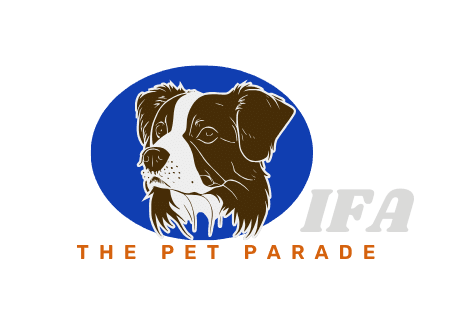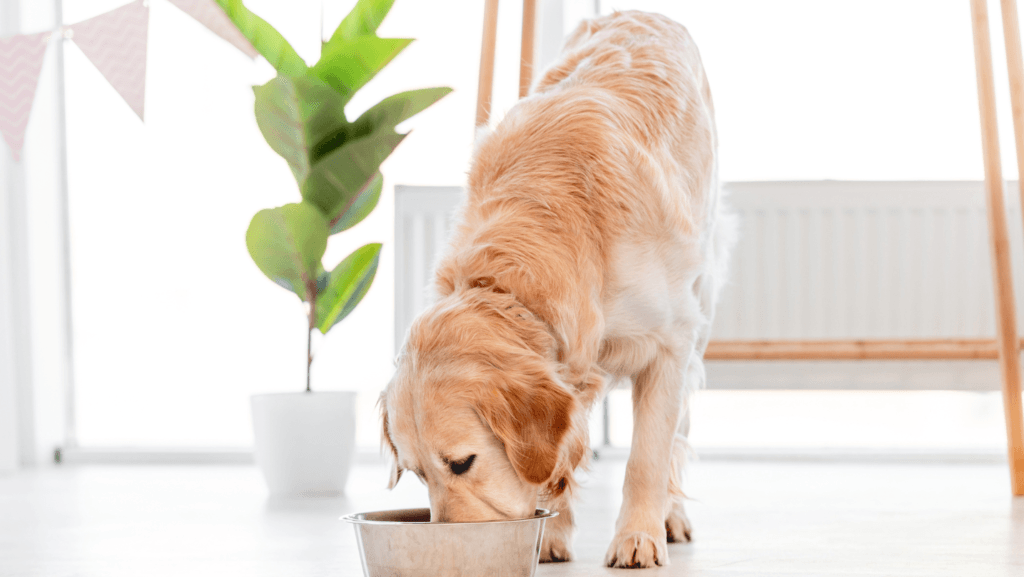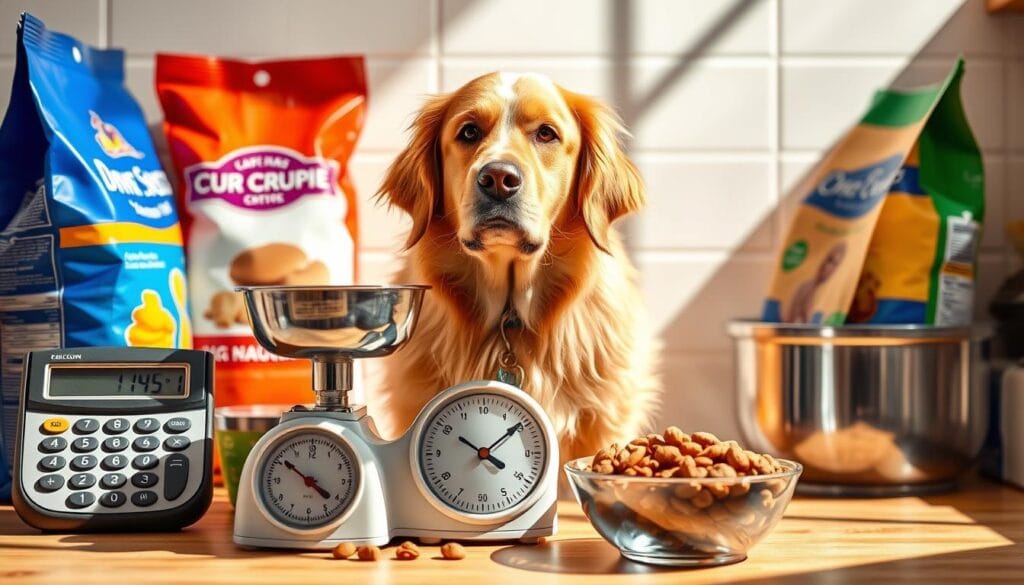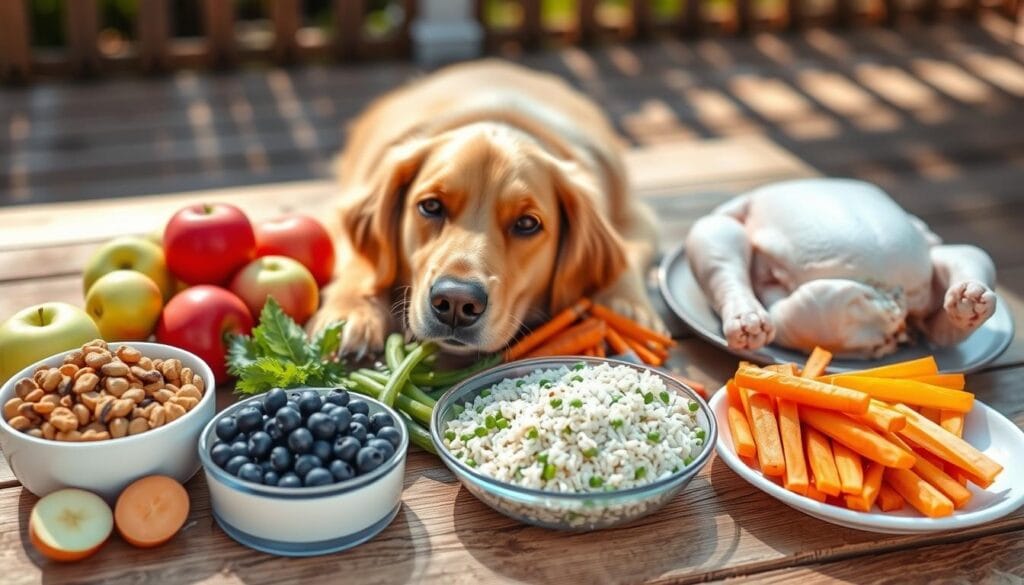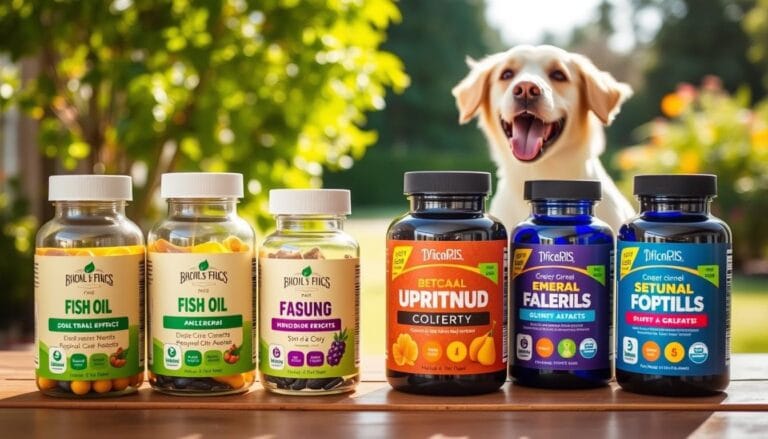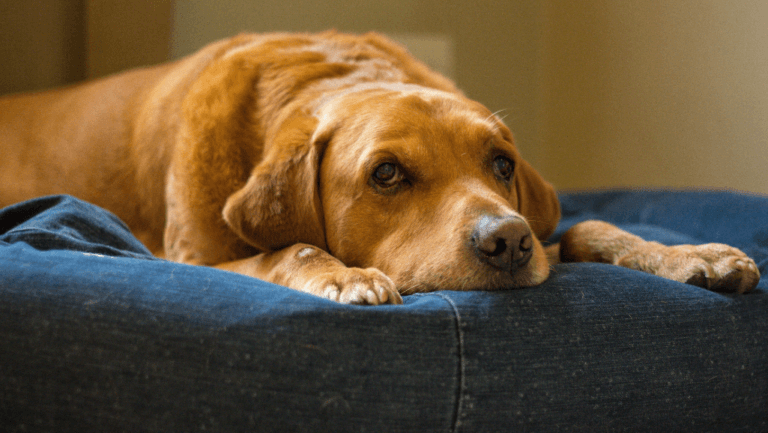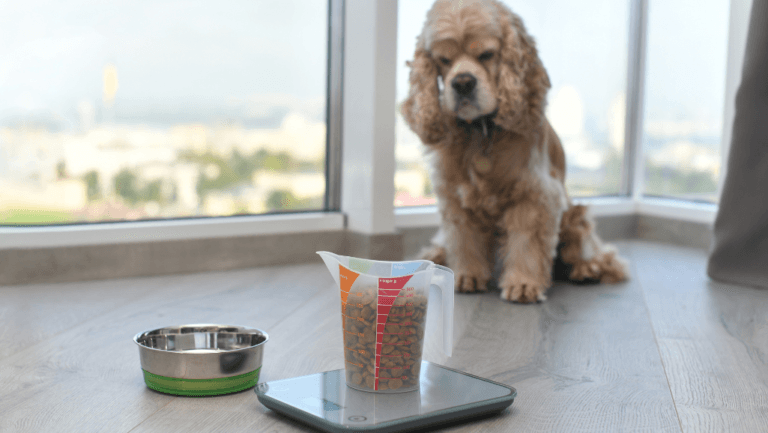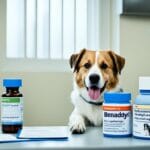Feeding your Golden Retriever the right amount of food is key for their health. As a beloved pet, knowing their nutritional needs is vital. A proper golden retriever feeding guide ensures they get the right dog food portions at each life stage. A balanced canine diet that matches their golden retriever calorie needs helps avoid obesity and health problems. It also keeps them happy and active.
Golden Retrievers need a special diet because of their unique needs. Their age, weight, activity level, and metabolism affect how much food they need. Adult female Golden Retrievers usually eat about 2 cups of dog food daily. Males might eat around 3 1/2 cups. But, every dog is different, so it’s important to check with your vet and watch your Golden’s weight to adjust their canine diet as needed.
Key Takeaways
- How Much Food Should a Golden Retriever Eat.
- Golden Retrievers have specific nutritional needs that require a balanced, high-quality diet
- Feeding your Golden the appropriate dog food portions based on age, weight, and activity level is crucial
- On average, adult female Goldens eat about 2 cups of food per day, while males consume around 3 1/2 cups
- Consult with your veterinarian and monitor your Golden’s weight to determine the right amount of food
- Choosing a premium dog food with quality ingredients can help prevent health issues and promote overall well-being
Understanding Your Golden Retriever’s Nutritional Needs
Golden Retrievers need a special diet to stay healthy. Their diet should include high-quality proteins, fats, carbs, and vitamins. A Golden Retriever diet should be balanced for their age, weight, and activity level.
Adult Golden Retrievers need 18–25% protein to keep their muscles strong. Puppies need 22–28% protein for growth. Fiber is also key, with 2–5% helping with digestion and preventing constipation.
Age and Life Stage Considerations
As your Golden Retriever grows, their diet needs change. Puppies eat more often and need more protein and calories. They should eat three meals a day until they’re six months old, then switch to two meals.
Adult Golden Retrievers need 450–675 grams of food daily, based on their age, weight, and activity. Feeding them twice a day helps keep their energy stable. As they get older, their diet may need to change to keep them healthy.
Activity Level and Metabolism
Your Golden Retriever’s activity level affects their calorie needs. Active dogs need more calories to keep their energy up. Less active or older dogs need fewer calories to stay healthy.
Choosing the right dog food is crucial. Look for high-quality proteins and complex carbs. Healthy fats, like omega-3s, support brain health and a shiny coat.
By understanding your Golden Retriever’s nutritional needs, you can keep them healthy and full of energy. Regular vet visits help monitor their health and adjust their diet as needed.
Feeding Guidelines for Golden Retriever Puppies
Feeding your Golden Retriever puppy right is key for their health. Many dog foods suggest how much to feed, but this can lead to overfeeding. It’s important to follow the right feeding guidelines and use growth charts to keep an eye on your puppy’s health.
Puppy Growth Charts and Weight Ranges
Growth charts for Golden Retriever puppies are very helpful. They show the expected weight for each month, helping you decide how much food to give. Here are some basic feeding guidelines for Golden Retriever puppies by age:
- At 7 weeks old, a Golden Retriever puppy will typically eat between 1/3 to 1/2 cup of dry puppy food per meal.
- By 3 months old, a Golden Retriever puppy may consume up to 1.5 cups of food per day, divided into three meals.
- At 4 months old, a Golden Retriever puppy’s daily food intake may increase to 2.5 cups, spread across three meals.
- Male Golden Retriever puppies at 6 or 7 months old may require up to 4 cups of food per day, while females may need around 3 cups.
Adjusting Food Portions as Your Puppy Grows
As your Golden Retriever puppy grows, you need to adjust their food portions. This helps keep them healthy and prevents problems with their bones and joints. Large-breed puppies like Golden Retrievers should eat three to four small meals a day for the first 3-6 months. After 6 months, they can switch to twice-daily feedings.
Choose a puppy food that has at least 22% protein and is made for large-breed puppies. It should also have the right amounts of calcium, phosphorus, glucosamine, and chondroitin for healthy bones and joints. Don’t let your puppy eat all day, as this can cause obesity and bad manners. Instead, feed them at set times to help with training and to keep an eye on how much they eat. Feeding them in their crate can also help them feel comfortable there.
Adult Golden Retriever Feeding Recommendations
As Golden Retrievers grow up, their diet needs change. It’s important to feed them the right amount to keep them healthy and prevent obesity. Adult female Golden Retrievers need 2 to 2½ cups of good dog food each day. Males usually require 3 to 3½ cups, split into two meals.
Maintaining a Healthy Weight
Keeping an eye on your Golden Retriever’s weight is crucial. You should be able to feel their ribs without too much pressure. They should also have a clear waistline when seen from above. If they look too fat, try giving them less food or adding low-calorie foods like green beans or canned pumpkin.
Studies have found that reducing a pet’s caloric intake by 30% after surgery can significantly reduce the risk of obesity.
Factors Influencing Food Intake
Several things can affect how much your Golden Retriever eats, including:
- Age: As dogs get older, they need fewer calories because their metabolism slows down.
- Spay/Neuter Status: Spayed or neutered dogs need less food than intact ones.
- Activity Level: Dogs that are more active need more calories to keep their energy up.
- Health Conditions: Some health problems might mean they need different food or calorie calculations.
When calculating dog calories, remember that high-quality food is more packed with nutrients. This means your dog might need smaller portions. Always talk to your vet to find the best diet for your adult Golden Retriever, based on their specific needs and health.
How Much Food Should a Golden Retriever Eat?
Finding the right amount of food for your Golden Retriever is key to their health. The food needs vary by age, weight, activity level, and food quality. Adult Golden Retrievers usually eat 2 to 4 cups of food a day, split into two meals. But, you should adjust this based on your dog’s needs for the best nutrition.
Puppies need more food and calories than adult dogs. They grow fast and need lots of nutrients. An 8-week-old puppy should eat about 1 and 1/2 cups of puppy food a day, in three or four meals. By four months, they need 2 to 2 and 1/2 cups of food to keep up with their energy.
As Golden Retrievers grow up, their food needs change. Adult Goldens weighing 55 to 75 pounds eat 3 to 5 cups of food a day. But, this can change based on the food type, the dog’s health, and how active they are. It’s important to watch your dog’s weight and adjust their food to keep them healthy.
“A 50-pound puppy aged six months or over will need about 1,500 calories daily, while active adult Goldens require 1,300 to 1,740 calories per day.”
Senior Golden Retrievers might need less food and calories than younger dogs. Their needs depend on their lifestyle, size, and how active they are. Neutered dogs and nursing females also have different calorie needs.
Always talk to your vet to find the right food amount for your Golden Retriever. Adjust it as needed based on their health and weight. This way, you can make sure your Golden Retriever gets the best nutrition at every stage of their life.
Choosing the Right Food for Your Golden Retriever
Choosing the right food for your Golden Retriever is key. They need special nutrients. Spot & Tango’s UnKibble is a great choice, as Ellie and Emma’s family can attest.
Quality Ingredients and Nutritional Value
Spot & Tango’s UnKibble uses human-grade ingredients. They cook and dry these ingredients gently. This keeps the nutrients in, giving your Golden Retriever what they need.
They get protein for muscles, fats for energy, and vitamins for health. Quality ingredients mean a healthier pet.
Avoiding Harmful Additives and Fillers
Stay away from foods with bad additives and fillers. Many commercial foods have artificial stuff and low-quality ingredients. Spot & Tango’s UnKibble is free from these, ensuring your Golden Retriever gets the best nutrition.
Grain-Free Diets and Taurine Deficiency Concerns
Grain-free diets are popular but can be risky for Golden Retrievers. They might lead to taurine deficiency, causing heart problems. Always check with your vet before switching foods.
Spot & Tango offers a meal plan tailored to your Golden Retriever. Their UnKibble is easy to use and doesn’t need to be refrigerated. They also offer a 100% money-back guarantee, so you can try it risk-free.
Conclusion
Ensuring optimal dog nutrition for your Golden Retriever is key. You need to think about their age, how active they are, and their health. Puppies eat more often and need more calories than adults. Senior dogs might need a diet change to stay healthy and manage age-related issues.
Choosing the right dog food is vital. Look for high-quality food that meets AAFCO standards. It should have real meat, whole grains, and essential nutrients. This helps keep your Golden Retriever healthy and happy.
Canine meal planning should fit your dog’s needs and likes. Some dogs do well on dry kibble, while others prefer raw or homemade diets. Always talk to your vet to create a meal plan that’s just right for your Golden Retriever.
Your vet can help with portion sizes, how often to feed, and any supplements needed. This ensures your dog gets the right balance of pet nutrition.
Remember, your Golden Retriever’s nutritional needs can change. It’s important to check their body condition and adjust their diet as needed. By knowing how much to feed your Golden and making smart nutrition choices, you can help them stay healthy. This way, they can live a long, happy life with you.
Learn more about feeding your Golden Retriever to keep them at a healthy weight. This helps prevent obesity and related health problems.
